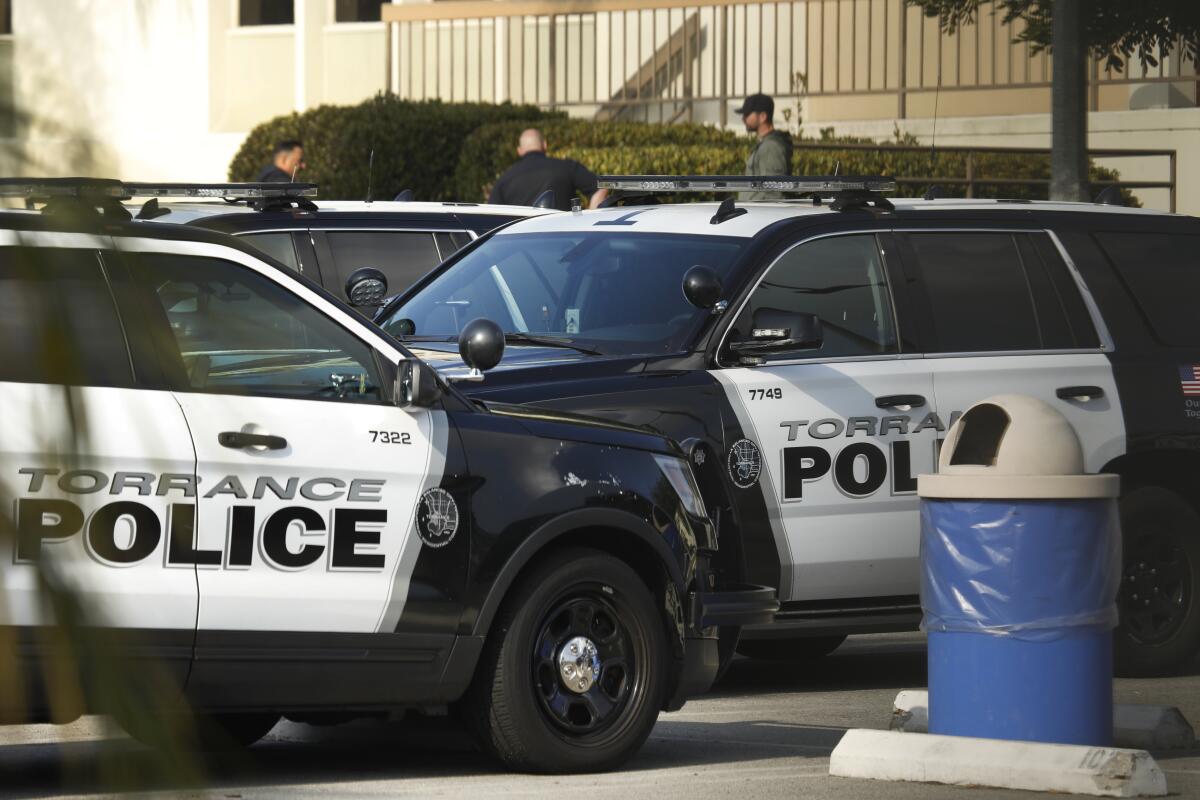Several Torrance police officers linked to racist text scandal no longer employed by city

- Share via
Several Torrance police officers linked to a racist text messaging scandal — including two who shot and killed a Black man in a controversial 2018 incident — are no longer employed by the troubled law enforcement agency, records show.
Eight of the 12 Torrance police officers whom The Times has publicly identified as taking part in the horrific text exchanges were not listed on the department’s active roster as of last November, records show. The police department provided the roster in response to a public records request, but has refused to say whether the officers were fired because of their links to the scandal or resigned. They would not answer any other questions about the unfolding controversy.
Four of the officers The Times has been told were involved in the scandal remain employed by the city of Torrance, however. One of those officers, David Chandler, is awaiting trial on charges he unnecessarily shot a Black suspect as the man was walking away during an on-duty confrontation in 2018. The Times also recently confirmed that Chandler remains an active member of the California National Guard.
The text scandal first came into the public eye in August 2021, when Los Angeles County Dist. Atty. George Gascón filed vandalism and conspiracy charges against officers Cody Weldin and Christopher Tomsic, who allegedly spray painted a swastika inside of a car that was towed from the scene of a minor crime in January 2020.
A search of the officers’ phones turned up roughly 390 “antisemitic, racist, homophobic or transphobic remarks” allegedly exchanged by a group of officers between 2018 and 2020, according to district attorney’s records.
The text messages were rife with racial slurs, jokes about lynching and shooting Black men and profane bragging about using violence against suspects. In one instance, an officer shared pictures of small coffins that he exclaimed would house the bodies of Black children the officers might have to “put down.” The messages also contained offensive remarks about Latinos, Jewish people and members of the LGBTQ community.
The scandal sparked an investigation by the California Attorney General’s Office, though that probe has yet to produce any public findings. A spokesman for Atty. Gen. Rob Bonta declined to provide an update on the investigation this week.
Tomsic and Weldin left the department sometime in 2021. Officers Brian Kawamoto, Joshua Satterfield, Omar Alonso, Anthony Chavez, Matthew Concannon and Enrique Villegas were no longer with the department as of November 2022, records show.
Kawamoto referred to Black men as “savages” in one text and vowed to “make Torrance great again” in another, according to those records. After another officer shared a news story about a man urinating on a Black child, Satterfield asked “what’s the crime?” those records show. Alonso openly complained about having to work with a gay officer and vowed to punch the officer, using a slur for members of the LGBTQ community, according to those records.
While The Times found no documentation that Concannon or Chavez sent racist text messages, sources previously confirmed they were under investigation as part of the scandal. The most controversial moment of their careers was also a topic of conversation in the texts: the fatal 2018 shooting of Christopher DeAndre Mitchell.
Mitchell, who was Black, was allegedly sitting in a stolen car when he was confronted by the officers in a Ralph’s parking lot, records show. Authorities allege Mitchell ignored orders to exit the vehicle. The officers opened fire when they allege he reached toward a weapon pinched between his legs. It was later determined to be an air rifle.
Prosecutors initially found Concannon and Chavez acted in self-defense, but the killing has drawn furious protests in Torrance and Gascón ordered a fresh review of the case when he took office in 2020. A spokesman for the district attorney’s office could not provide any update on the review.
According to a district attorney’s office report on the text messages, one officer used the N-word to refer to Mitchell’s relatives the day after the shooting. Others joked about lining up in Concannon or Chavez’s yard with their guns out like a firing squad if protesters marched on one of the officer’s homes, according to that report, which redacted the names and phone numbers of the officers who sent each text.
Attorneys for the union representing Torrance police officers and private counsel for some of the officers declined to comment.
Initially, 17 officers were connected to the scandal and placed on administrative leave. However, sources previously told The Times that some officers linked to the scandal were under investigation for being part of the various text message chains, but they did not actually send offensive messages.
The Times has been unable to identify four of the 17 officers involved. A law enforcement source with knowledge of the situation said several officers linked to the scandal have been brought back to work, presumably because they did not send any racist or threatening messages. The source spoke on the condition of anonymity because they were not authorized to discuss the case.
But three officers The Times has previously linked to the scandal remain on the department’s roster: Chandler, Blake Williams and Christopher Allen-Young. Williams sent a picture of the bodies of several Black people who had been lynched to other officers, with the caption “hanging with the homies” written underneath, records reviewed by The Times have shown. Allen-Young also used slurs to refer to Black people and shared a joke about arranging to have police shoot a Black man during a traffic stop.
Chandler, meanwhile, not only remains employed by Torrance Police but is also an active member of the California National Guard. He joined the Guard in 2020 and holds the rank of “warrant officer” in an aviation brigade, according to Lt. Col. Jonathan Shiroma, the guard’s chief spokesman. It was not immediately clear how the filing of charges had affected his status with the military.
“Civilian convictions, or investigations containing substantiated misconduct, may be the basis for adverse administrative action, the nature of which depends on the facts and circumstances of the case, as well as any civilian penalties,” Shiroma said in an email. “Adverse action for officers is retained at the Assistant Adjutant General level and could range from informal counseling to initiation of separation from the military.”
More to Read
Sign up for Essential California
The most important California stories and recommendations in your inbox every morning.
You may occasionally receive promotional content from the Los Angeles Times.











